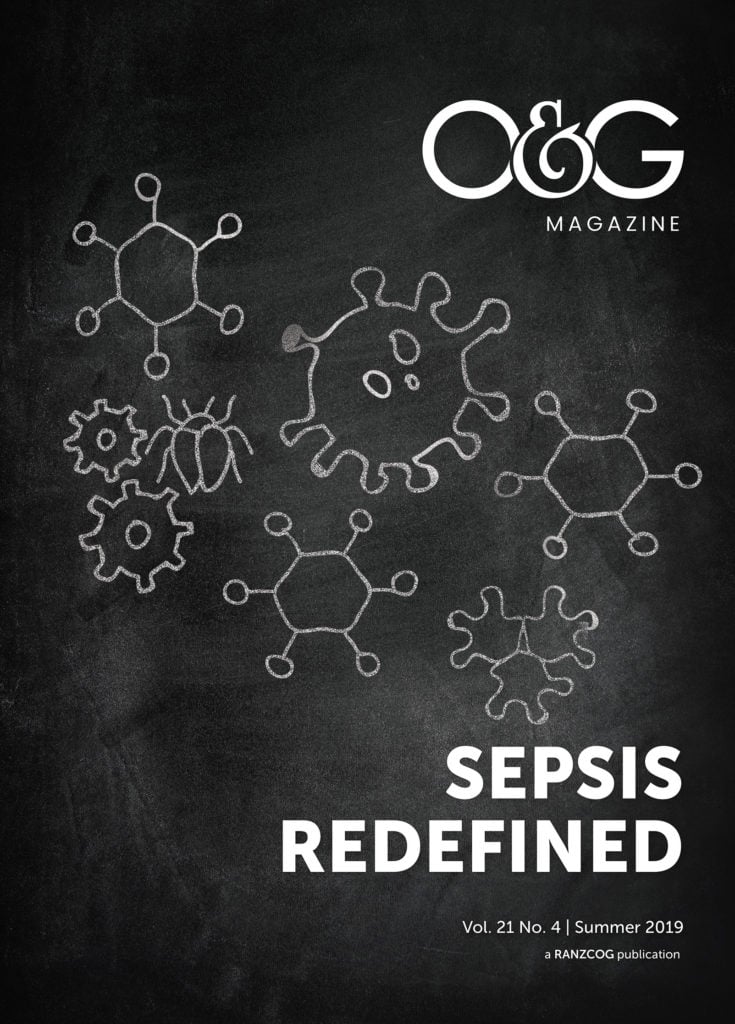This is an abridged version of the Brian Spurrett Oration delivered at the Pacific Society for Reproductive Health 13th Biennial Scientific Meeting in Port Moresby, Papua New Guinea, 6–11 July 2019. The full Oration is published in the Pacific Journal of Reproductive Health 2019;1(10):480-4 and is reproduced here with permission.
Thank you for the opportunity to give this Oration. This is a huge honour and I thank the local organising committee, the PSRH Executive, the RANZCOG Women’s Health Foundation Board, the Global Health Committee and the Board. At this, 13th PSRH, we acknowledge the leaders and visionaries who have come before us, in whose paths we walked along, across and between these wonderful islands of the South Pacific.
Today we pay tribute to Prof Brian Spurrett OAM, whose legacy lives on in the scores of Fellows – obstetric doctors and midwives, who have had opportunities to travel, to learn more and to bring skills and capacity back home. Brian was a visionary, he knew that doctors and midwives in this region had enormous capacity and skills, but that mentoring, access to education and networking were needed. Like many of you here today, Brian had a vision to make a difference.
You are here because you want to make a difference. A difference to the communities you live in and serve, a difference to women, mothers, babies, children and adolescents. My oration today is about the difference we all want to make, but none of us can make a difference alone. We need to do it together; however, we need to have systems and processes that let us make a difference and ensure that everyone gets access to the best care, to quality care, to care that not only ensures that people survive, but that they also thrive and can transform their communities.
Access to quality maternal and newborn care will save lives. If every woman had access to educated, regulated and supported midwives for pregnancy, labour and birth and the postpartum period; and if every woman could access specialist care from doctors when she or her baby needed them, lives would be saved. If every child was fully breastfed for six months and had all their vaccinations, lives would be saved. If all women were able to access modern contraceptives and could decide whether and when to have children, lives would be saved.
There is strong evidence that access to midwives in a supported health system will save lives and improve outcomes, but it is not enough to just put a midwife at a health centre and expect everything to be solved. They need good training to start with and this training must include evidence-based knowledge and mentored clinical experiences. The midwife needs to be deployed soon after finishing preservice education, so they do not forget things. They must have the drugs they need – iron tablets, oxytocin, misoprostol, magnesium sulphate, immunisations, contraceptives – and a fridge to put them in along with electricity or a generator to run the fridge. They need basic things like a blood pressure machine, urine dipsticks and a bag and mask to resuscitate a baby.
The midwife needs to be able to provide kind, respectful care so that women will come back – more than just once – and they will come back to give birth. The midwife needs to be in a system that has a nice space for antenatal care, that welcomes women’s companions in labour, ensures that women feel supported and safe throughout their labour and birth and, very importantly, are not left alone.
The midwife needs the time and space to do postnatal visits, to make sure women are supported for skin-to-skin, breastfeeding, immunisation and family planning. The midwife needs a phone or radio so they can ring for help or advice if they need. The midwife needs access to a vehicle or a boat if they needs to transfer the woman, especially in labour. The midwife needs someone to debrief with when things go well and when things go badly. The midwife needs continuing education and supportive supervision so they can learn, grow and feel good about their work. The midwife needs to be paid on time and be able to have days off and leave to balance their family life with their work.
At the referral hospital, the midwives and doctors also need a supportive system. This includes drugs, equipment, phones, support and access to an operating theatre, blood bank, and laboratory. The hospital needs enough space to accommodate the mothers, their companions and family (both in labour and postnatally), and their new babies. The hospital needs senior staff who can provide training, advice and support when things are hard or complex, and also for debriefing. The hospital also needs to provide staff with a safe environment to work and to pay them on time. Midwives and doctors need kindness, from their managers and from each other. No one can be kind and respectful to women if they are being scolded or shouted at by their colleagues or they feel frightened to ask questions or admit mistakes.
Having all of these things probably sounds like a lot. For some of you, I am just describing your everyday work – you know these things are important and you already have them. You can reach those most in need in the communities you serve – the poorest and the most disadvantaged. For some of you, you don’t have these things, but you know you need them. You are frustrated. You know you need a functional health system to do your job. You need a system that lets you be the best midwife, doctor, nurse or community health worker that you can be. You need a health system that can make sure that everyone gets access to care, and no one is left behind.
So, what will it take to build better systems? You know what you require – the workers, the drugs, the buildings and the water. But how do we transform these specifics into resilient and functional systems?
We need knowledge. We need to know what is currently going on – we need data. There is a saying ‘no data, no problem; no problem, no solution’. So, we need data to know if we have a problem and to plan and evaluate a solution. We need data that is in real time or close to real time. We need to know when the stocks are low, when the drugs are expired, when the roads are washed away and the vehicle cannot get out or in, when the health workers are sick and cannot be at work and when we need to arrange back up.
We need a well-educated and well-supported health workforce. The workforce needs up-to-date curriculums, education programs that provide quality learning, simulation, supported clinical experiences and a career path. We all need ongoing updates – what we learned 10 or 20 years ago is not enough. We need to do skills and drills, every day or at least most days. These drills will make sure we can respond quickly in an emergency and we know how to work together as a team. Cross-functional and interdisciplinary learning is needed. We will all work better together, and more respectfully, if we understand what we all can do. We need to understand our different scopes of practice and what we bring uniquely to the bedside or to the community and to be clear about our roles.
We need to learn together, support one another and be respectful and kind to one another. This is especially important on the days when things go badly and we are stressed, tired and (maybe) grumpy or scared about what will happen next. Caring for one another also means we are more likely to admit when we make mistakes and learn from these mistakes. Caring for one another also means we will provide better care to women, babies and their communities.
We need to support the gathering of evidence – to show how things could be better, to test out new or different ways to make things better, and to scale up or roll out things that we know work. Many of you will be thinking – that is research, that is for other people, that is not for me. I am just a midwife, doctor or nurse and I just want to do my job. Well, using evidence in our work is part of our job. Scaling up what we know works from the research is part of our job. Changing the way we do things and testing out if this is better is part of our job. Being brave enough to change because of the evidence, this is part of our job.
Then we need to learn how to be advocates. How to take what we know, use our voice and influence policy makers, health service managers and the government. Advocacy is the process of building support for an issue or cause and influencing others to take action. Your advocacy must engage with the community, especially those leaders involved with groups for women and youth.
While you may not have specific resources dedicated to conducting advocacy activities, there may be partners in your country or at the regional and global levels who you can work with. There will also be NGOs you can work with. Local community and village organisations and women’s groups who will help you to advocate for change. Working with women and women’s groups is essential as they know what is needed.
Media coverage is often a great way to ensure your advocacy message reaches a wide and varied audience. Having your message broadcast increases public awareness of the issue and often generates broad support. There are a number of international days of celebration that might be worth using for the media. International Women’s Day, International Day of the Midwife, International Day of the Nurse, World Health Day, International Youth Day, World Contraception Day, International Day of the Girl and the International Day for the Elimination of Violence Against Women. That is a lot of days to use as advocacy for mothers and babies. Another important advocacy time will be 2020, which WHO has designated the Year of the Midwife and the Year of the Nurse.
In all this work to build better systems, keep women at the centre. The systems must not be about us – they must not be designed just to work for us – they must first work for women and their communities. All women deserve access to quality care – especially the poorest, the hardest to reach, the disabled, the most vulnerable and ones who run away from us or do not choose to come to us for care. We need to make sure the systems work for them, so that they feel supported, respected, listened to and engaged in their care.
Universal healthcare will only happen when women are at the centre, gender equity exists and violence against women stops. These are big issues that won’t be easy to solve, but we can all do our bit. We can all provide the best quality care that we can. We can be kind to the women and communities we serve and to each other. Kindness is free and you don’t have to wait to have a perfect health system to be kind.
Finally, we all need courage. Brian Spurrett had courage and determination to make things better. He could have just stayed at home and done his day job. You could all just stay at home and do your day job, but you are here. You have fundraised, got sponsorship, saved up, gone without or borrowed to get here. Many of you came to workshops over the weekend to learn and share – that takes courage – courage to admit we don’t know it all and there is more to gain. Many of you are giving presentations here at PSRH, some for the first time, and that also takes courage. You will go back with new ideas and new practices that you will try and encourage others to take up or you will teach others to do – that takes courage.
We all need a booster vaccination of hope, energy and commitment and a good dose of courage. Because we know that we cannot leave anyone behind. Our countries and our communities will only be strong and powerful when we leave no one behind. When we have gender equity at all levels, when all our girls and boys are educated equally and have equal access to high school and further education, when our women can safely choose if and when to have children, when our mothers can give birth safely and our babies grow up to be strong and confident members of the community. I know we can do it.






Leave a Reply